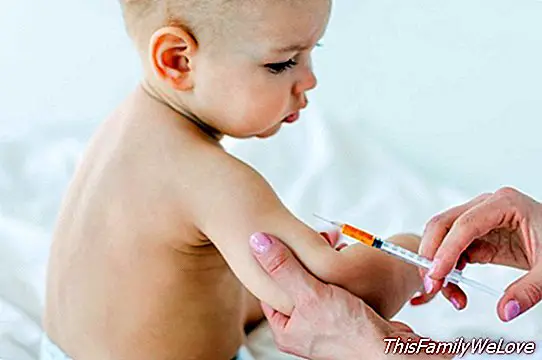Vaccines, why so many? This is what the AEP says

Today it's time to get vaccinated. How will my baby react? Normally, I cry and cry a lot, some to the point of turning purple. The mother also suffers. But the baby must always notice that he is protected by his mother or father. Through caresses, hugs and acurrucos, the child will feel more secure.
Babies need to be vaccinated to protect them from childhood diseases, diseases that can have serious complications and even cause death. Being smaller, your immune system has not yet fully developed and that is why it is the best time for vaccination.
Why so many vaccines?
Thanks to science, diseases that previously caused serious infections that could even cause death can be prevented with vaccines. Do not worry about having to put so many vaccines to your baby in very short periods and even some at the same time. It is proven that nothing is going to happen to the baby. Maybe I can have different reactions, but they are normal.
Syringes And why with needles?
Is there no other system? Many of the vaccines are more effective intramuscularly than orally. Sometimes, vaccines that are administered orally, do not reach the child's body well because they vomit it, spit it on, etc.
It seems logical to think that syringes or small needles represent the best alternative when giving an injection to a baby. However, researchers in the UK suggest that large needles, instead of small needles, make injections less traumatic for both babies and parents.
Types of vaccine reactions
What kind of side effects can vaccines given to babies cause?
They can be of different types:
- Fever: of variable intensity and duration, It may appear soon after vaccination and rarely persists more than 48 hours. You can be given an antipyretic to lower paracetamol-type fever.
- Other side effects can be, depending on each of them: mild fever, rash or pain at the injection site. A slight discomfort is normal and should not be a cause for alarm. You are given an analgesic or you are given a suitable local ointment prescribed by the pediatrician.
Why the booster doses?
Many parents wonder why so many memories are necessary. Is not a dose enough? Vaccines provide a stimulus for the body to be able to produce specific antibodies, that is, for the human body to generate defenses against certain diseases.
With a first dose the adequate levels of antibodies are reached, but they are not sufficient to fight the disease. These antibodies will remain in the body thanks to the booster doses. When a baby is vaccinated, the immune response it produces has a limited duration. That is why after a certain time, depending on the type of vaccine, a revaccination is recommended.
AEP recommendations on childhood vaccines
The Vaccine Advisory Committee (CAV) of the Spanish Association of Pediatrics (AEP) insists on the use of inactivated polio vaccines, at any age, and recommends the varicella vaccine and the conjugate pneumococcal vaccine. The chickenpox it is a disease that affects practically the entire child population. In the vaccination schedule proposed by the AEP, a dose is administered between 12 and 15 months, preferably simultaneously with the triple virus, but with a different syringe and in different places. When they are not administered in the same visit, they must distance themselves, at least, one month.
Pneumococcus is a bacterium that causes very frequent infections in children under two years of age that can be very serious. The two serious processes that can trigger this bacterium are pneumonia and meningitis. The vaccine against conjugated pneumococcus heptavalente (VNC 7-v) offers a high protection against the infection produced by this bacterium with a primary vaccination at 2, 4 and 6 months of age and a booster dose between 12 and 24 months. Likewise, it recommends the vaccination of children older than 24 months in which there are risk factors for invasive pneumococcal disease.
Advice on your baby's vaccination
1. The immunization record is very important Keep it in a safe place from the first day it is given! It should start at the time the baby receives the first vaccine and will be updated each time the child receives the next.
2. Parents must always be in the child's field of vision to give security at the time of the vaccine.
3. While the doctor or nurse gives you a shot, It is very good that our son feels us, palpates us (caress the skin, speak softly, offer his pacifier after the vaccine, embrace him).
4. In oral administration it is necessary to control your hands and hold his head.It is advisable before the bottle or the baby food.
5. More than one vaccine can be given on the same day and in different places.
6. Vaccines can be given if the child has a cold without a fever or a little cough.
7. The child receiving the polio vaccine should have a half hour of fasting before and after the administration of the vaccine. If the child vomits during the 20 minutes after this vaccine, the dose should be repeated.
8. It is very common that the MMR vaccine causes redness, swelling, pain.
Do not be afraid to ask the doctor all the reactions the child may have after the vaccine and what to do against those reactions. The child may feel listless the next few days, and do not force him to take anything if he does not accept it.
Georgina Esparch




